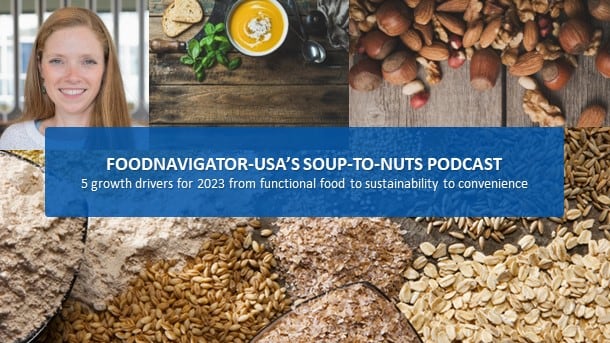Not everyone will make it, and many of those that do reach other side won’t do it alone, opting to merge with other players as Tofurky did last week when Morinaga Nutritional Foods acquired it.
In this episode of FoodNavigator-USA’s Soup-To-Nuts Podcast, stakeholders from across the value chain share what it will take for plant-based meat to pass through the lowest points in the valley of disillusionment and climb up to the informed optimism phase and eventually a new plane of success. According to Eben Bayer, co-founder and CEO of MyForest Foods, Lisa Feria, the CEO and managing partner for Stray Dog Capital, and Taly Neschushtan, the CEO of the chickpea protein ingredient producer InnovaPro, the future of plant-based protein needs to be cleaner, healthier and more accessible.
[Editor’s note: Never miss an episode of FoodNavigator-USA’s Soup-To-Nuts Podcast – subscribe today.]
Where is plant-based protein in the current landscape?
According to IRI data crunched by 210analytics, the $84m in combined refrigerated and frozen plant-based meat sales sold in the four weeks ending Dec. 25, were down 3% from the same time in 2021 and down 0.3% for the full calendar year even with higher prices due to inflation helping to pad the numbers.
The decline is far from universal as IRI data reveals in the 6.8% year-over-year sales increase for frozen meat alternatives compared to the 13.5% decline in refrigerated meat alternatives. But the combined effect is grim with sales for both in calendar year dipping 0.3% to $1.18b.
Units, which are a better indicator during the current economic environment, show an even more dire picture with a startling 12.3% drop in combined fresh and frozen plant-based meat products in the four weeks ending Dec. 25 over the same time in 2021 and a 8.2% in calendar year 2022.
Has plant-based protein hit the bottom, yet?
While decidedly not good, this decline isn’t all bad, either, according Eben Bayer, co-founder and CEO of MyForest Foods, which makes bacon and will soon introduced a beef jerky alternative both made from whole cut mycelium or gourmet mushroom.
He explained all new technologies and concepts must pass through the trough of despair or valley of disillusionment before they are on solid enough ground for mass adoption – so plant-based protein’s fall isn’t unique, and it isn’t the end.
“We’re almost to the bottom” after two years of slowdown, “and the hangover is going to take probably 12-18 months … we already started that last summer, so we’re maybe halfway through that. But I expect to see lots of green shoots across the category in the fall,” he said.
But, how did the category find itself in its current predicament with watermark sales during COVID tumbling into the trough of disillusionment?
Bayer attributes the rapid rise and fall of plant-based meat to date to three major factors: environmental concerns that prompted consumers’ original interest, a rising demand for healthier products that ignited their initial push back from many existing options, and a desire for products with simple, clean labels and ingredients they can understand.
Increased consumer price-sensitivity also is contributing to the decline in plant-based meat sales and unit velocity, according to Feria. But she added, this should be relatively short-lived as the economy recovers and as more Gen Z consumers, who are more willing to pay a premium for the products they want, move into their buying prime.
The future of plant-based protein requires brands and retailers to work together
All of these factors – declining sales, consumer push-back against existing offerings, economic constraints – are pushing many retailers to reconsider their product mix and how many plant-based proteins they should stock and how many facings each should get. And as this SKU rationalization gains momentum, category players will need to work harder to justify their slots and drive velocity so they can escape the trough of despair.
But always one for finding the silver lining, Bayer explains that a culling of the category will help the brands that survive ultimately thrive.
“They are scaling back” on me-too and redundant products, but not on novel or diverse entrants, he said.
“Whether it’s bacon, whether its whole cut fish fillet, whether it’s a whole cut chicken breast, right, these are definitely addressing new needs in the market,” Bayer said. “A lot of great businesses get built by starting in niches.”
Feria recommends plant-based protein players defend against SKU rationalization by understanding what retailers need and then using data to deliver a product and story that meets that need.
Finding a path out of the trough of despair
For the plant-based meat market to pull itself out of the trough of despair and earn a sizable spot on store shelves and consumer pantries, they will need to do more than defend themselves – many will have to remake themselves with better nutritionals and cleaner labels.
As Feria explains, the future of plant-based protein is less about effectively mimicking animal protein and more about offering something that is both delicious and nutritious.
Bayer explains that many plant-based protein consumers equate healthy and better-for-you with clean label, which is easy for him to achieve because MyForest Foods’ short and simple ingredient list features whole cut mushroom meat and better nutritional profile compared to pork bacon.
For products not based on whole cut mushroom, cleaning up labels likely will require a helping hand from ingredients suppliers, notes Neschushtan.
“The ingredient space is like the enabler for the CPGs to become more innovative, meaning all those companies that re doing meat substitutes or dairy alternatives or egg replacements, they wouldn’t be ale to be considered innovative if they used the same ingredients, the same methodologies, the same processes as the did in the past. So, they must have collaboration with ingredient companies,” she said.
She added that InnovoPro is focused on teamwork and bringing new ingredients to the market, including is lineup of novel chickpea protein-based ingredients that work across plant-based categories, including meat, dairy and egg alternatives.
Plant-based protein prices must come down to increase access
Plant-based protein brands that emerge from the trough of despair also will need to tackle their price point – a challenge that has plagued the space from day-one but which companies cannot solve by themselves.
Feria explains many players in the space have dramatically lowered their prices as they have scaled and some have even achieved price-parity, but few consumers see this because many retailers treat these products as margin-drivers rather than loss leaders.
She explains the most effective way to negotiate with retailers is to use data to show why they should not exceed the suggested retail price and how offering plant-based protein for less actually could generate higher overall store sales, similar to the synergies dairy milk offers stores.
Are investors still interested in plant-based protein?
This same data-driven story also will increase plant-based protein company’s chances of securing funding in the coming years – something Bayer notes is becoming increasingly hard to come by.
“It is a bad time to be raising money if you’re in the sector. A lot of investors deployed capital evaluations that were probably too high and possibly in businesses that didn’t have the fundamentals to support them. … And the net result is a lot of companies will go out of business this year,” he said.
But, he added, those businesses with solid fundamentals will survive and when they do investors likely will be waiting.
Neschushtan agrees that funding for plant-based protein is harder to secure, but she says she is seeing investors slowly come back to the space. However, she adds, they have a different mindset now than during the peak mania for plant-based meat.
“We see them coming back differently and in a different mode. They’re become more strict. Demanding enhanced due-diligence processes. The look more on the short term for traction, and they look for companies that are income generating, and have a clear path to profitability,” she explained.
She also noted investors better understand there is more to plant-based than protein alternatives, and so she expects to see more capital deployed in the ingredient segment and other areas that have not repeated the same mistakes as the protein segment.
As more investors return to the plant-based protein space and players address the problems that sent their category plummeting into the trough of despair, they will eventually emerge on the other side, which Bayer says won’t look as great as the peak, but will still be “great” with plant-based re-emerging as a dominate portion of the general population’s diet.




